Globe-trotting attorneys offer new-era strategies for efficient business travel

In this age of ever-changing rules and regulations, business travel can be more difficult than ever. The reality is that the more preparation and planning that go into a business trip, the more likely it will be a success.
“As you get older, travel changes,” says Paul Justas Sarauskas, counsel at Mayer Brown in Chicago and a member of the American Immigration Lawyers Association. “When I was younger, it was exciting. It’s become more stressful and annoying because of security and everything else. These days I try to bring back the fun and take out the stress.”
That’s why Sarauskas makes a point to stay in a hotel near, but not where, a conference is being held and then wander.
“I like the variety,” says Sarauskas, who uses Booking.com. “Some of my colleagues only stay at the Marriott or another chain hotel to get the points. I like the adventure, to change hotel brands from boutiques to huge chains and B&Bs to get a different feel each time. I find a place where I can walk to everything in the area. Then you can find a restaurant that calls your name. That’s part of the adventure.”
To make travel less stressful, he arrives at O’Hare International Airport in Chicago at least three hours in advance of any flight—domestic or international—so he doesn’t have to worry as much about getting stuck in city traffic. He does work at a bar or restaurant or at the gate. To make navigating the airport easier, he always checks a bag so he can bring a compact carry-on. Sarauskas doesn’t stress about delayed luggage, relying on credit to purchase anything he might need if his bag doesn’t arrive right away. His other suggestion: Arrive the day before an event or hearing takes place to get acclimated.
“I’m all about eliminating points of stress,” says Sarauskas, who lived in Italy for more than a decade and jokes about how his luggage was lost many times while living abroad but always found a day later.
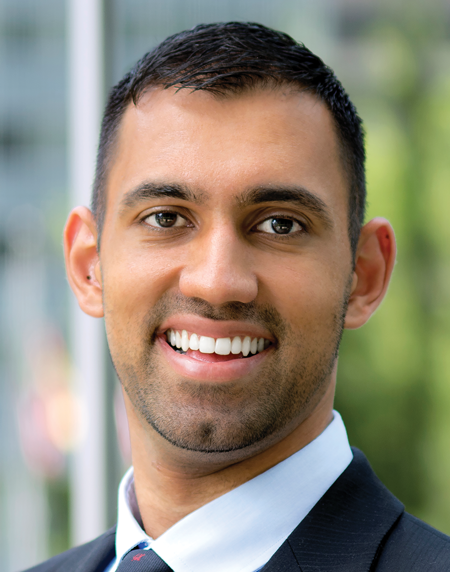
Shawn Toor
NAVIGATING AIRPORTS, BORDERS AND FLYING
Besides getting TSA Precheck and Global Entry, some attorneys are turning to the expedited security program Clear, which uses biometric technology, scanning passengers’ eyes or fingerprints at a kiosk to allow them to bypass TSA ID checks and go straight to the usual physical screening.
“Global Entry is the best thing in the world to help you,” says Randall Kessler, founding partner of Kessler & Solomiany in Atlanta, who gets the Clear service free as a Delta Medallion Million Miler flyer. “But Clear helps you cut to the front of the TSA Precheck lines and there’s never any wait.”
Tad Thomas, founder of the Thomas Law Offices, a personal injury law firm in Louisville, Kentucky, is also a big fan. He pays $179 a year and says Clear helps him save time in busy airports. More than 20 U.S. airports now have it, including New York’s JFK and LGA, and Washington, D.C.’s DCA and IAD. Users, who must be U.S. citizens or permanent residents, can start the process online but have to visit one of the company’s airport kiosks with a U.S. driver’s license, passport or other form of official identification.
To keep up with various changes in rules and regulations, Sarauskas suggests frequently viewing updates from the U.S. Department of State.
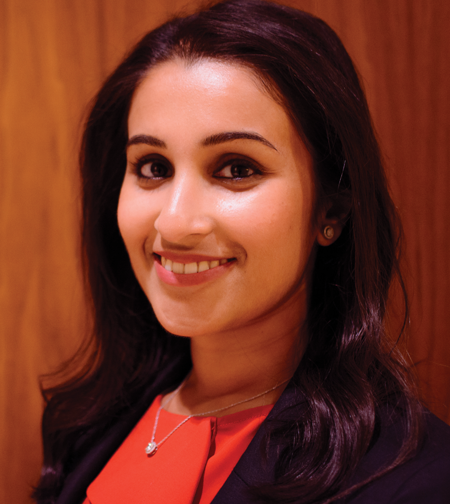
Zainab Hussain
Shawn Toor, an associate attorney who focuses on business and real estate transactions at Williams Kastner in Seattle, uses a Nexus pass to travel quickly across the Canadian border. It can also be used in dedicated Sentri lanes when going between Mexico and the U.S. “There’s a separate line at the border to go through TSA Precheck,” Toor says. “And I use it when I drive across the border too.”
Zainab Hussain is an associate at the Foundry Law Group, a Seattle-based firm that specializes in data privacy and intellectual property. She was in Saudi Arabia, where her parents live, when the first travel ban was imposed by President Donald Trump. Although Hussain—who was born in India, grew up in Saudi Arabia and became a permanent U.S. resident in December—usually brings a laptop to conduct work, she’s going to think twice about it now since she’s worried about theft or damage in her checked luggage, given the electronics ban. Her plan is to put any important documents she might need in the cloud instead of on her hard drive and to access them via Dropbox or OneDrive. She also makes sure any important documents that might require a credit card, such as applications for a trademark or business license for a client, are done before she leaves on a trip so financial information isn’t compromised.
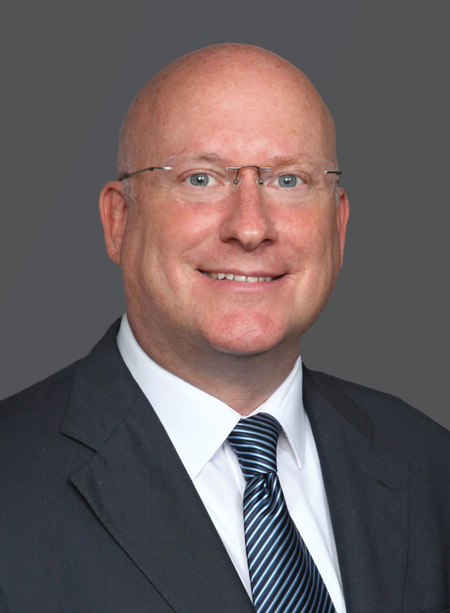
Paul Justas Sarauskas
When it comes time to get through security at customs, Sarauskas says it’s important to stay relaxed even if some of the agents are overly aggressive. “Smile,” he says. “And make sure to have a business card handy. They question everyone lately and the question will make you feel like you are doing something wrong even though you’re not, so always stay relaxed.”
Alan K. Brubaker, a partner at Wingert, Grebing, Brubaker & Juskie in San Diego who travels with a CPAP machine for his sleep apnea, says customs and TSA are always curious about his laptop-size device. “But it’s a lot more common than it was five years ago,” says Brubaker, who packs distilled water for his machine in several reusable stainless steel bottles inside his checked luggage. “And now they just say CPAP to the person manning the X-ray machine.”
Like many of his counterparts, Kessler uses his Priority Pass membership to access more than 1,000 airport lounges worldwide, which also allows him to rent a conference room if he needs to make a conference call in private. He also uses Skyroam, a global hot spot to get secure Wi-Fi.
To save time, Kessler says, he arranges his flights so they never leave or land during rush hour, which helps him avoid getting stuck in traffic. “I love getting in during the middle of the night. Then there’s no hassle at the airport,” he says.
See also: 13 tech tools for business travel
Thomas, who travels at least three days every week, avoids traffic by flying out over the weekend, when there’s less business travel. Smaller crowds make it easier for him, since he has a connection on 90 percent of his flights. To get real-time updates on when his airplane will land, Thomas uses his FlightAware app.
Kessler also uses the Hertz Platinum program, which will send a representative to meet him at the terminal and give him a ride back to the airport once he drops off his rental. To keep working while he’s in-flight, Kessler pays $29.95 a month for PhoneTag, a voicemail-to-text service that immediately transcribes a voicemail, which helps Kessler respond via email while he’s midflight. Through a credit card, he also has a complimentary subscription to Gogo, an in-flight internet provider that charges a flat monthly fee, which allows him to maximize work time.

Shutterstock
PACKING, LUGGAGE AND COMPLICATIONS
John Quick, a partner at Weiss Serota Helfman Cole & Bierman in Coral Gables, Florida, who handles every-thing from bankruptcy and collections to civilian oversight of law enforcement, jokes that he first learned how to pack during his first job as a “professional folder” at J.C. Penney.
If it’s a short trip, Quick saves time and aggravation by carrying on. He recommends a lightweight suitcase with four wheels since he’s had other styles break on the cobblestone streets of Budapest and Paris.
For international travel, Quick opts for a 30-inch suitcase, packing heavier items like shoes and paperwork at the bottom so they aren’t rolling on top of his clothes, followed by pants, undershirt, shirts and undergarments on top. He always brings a wetsuit bag for soiled clothes and a bathing suit. He also rolls his ties around a couple socks to avoid getting a crease. Quick’s other go-to item: a hanging toiletry bag by Flight 001 that he puts on the back of his bathroom door to keep his sink from getting cluttered.
Quick’s worst travel experience was walking into court in Jacksonville, Florida, when a person with a big pretzel and mustard spilled it all over Quick. “There was nothing I could do,” Quick says. “I took off my coat and the first thing I told the judge was someone spilled on me and I thought it would have looked worse to have it on. Luckily the judge didn’t have a problem, but he appreciated me addressing it right off the bat.”
Never open your suitcase to wrinkled clothing again. We’ve compiled videos of some of the best travel packing hacks that are suited for everything from simple business travel to around-the-world adventure.
He’s not alone. Thomas says when American Airlines lost his suitcase during a conference in New Orleans, he had to wear the same jeans and shirt two nights in a row, after being promised the suitcase would arrive. “I played it up,” he says. “I wore beads to the conference and explained why I looked the same as I did the night before. Then people feel bad for you.”
Brubaker, who likes to fold his suits lengthwise in his suitcase and then fold the collar back toward the bottom of the coat, says he left a highlighter in his pocket that bled through his white shirt during a flight to San Francisco. To replace his shirt before a meeting for a class action lawsuit at 8 a.m. sharp, he arrived at clothing retailer the Hound and knocked on the back door to seek a replacement.

Liz Espín Stern
Liz Espín Stern, a Mayer Brown partner in Washington, D.C., and leader of the law firm’s global mobility and migration practice, had a fellow passenger’s coffee spill on her and makeup remover open up in her suitcase, soiling a suit. In both instances, Stern says, she had to act fast by asking a concierge where to go, and pay a lot of money to hire a driver and acquire a new suit to get the job done.
To make packing easier, Stern duplicates her favorite travel pajamas—one for summer, one for winter—with two toiletry bags ready to go, along with a “what to pack” list on her iPad to make sure she doesn’t forget anything. She keeps a pair of hotel slippers in her briefcase to help her feel more relaxed on the plane. Stern always brings a couple of Bounce dryer sheets in her suitcase and briefcase to keep her clothing from looking wrinkled. She also suggests running the shower for a few minutes to add moisture to the hotel room to sleep better in the evening.
For Stella Lellos, a partner at Rivkin Radler in Uniondale, New York, one of the hardest things to do was travel with a breast pump. “If you aren’t traveling with a baby, you have to figure out a way to store the milk,” she says. “And that all depends on how long you are traveling.”
Lellos was in London when she had to ask her five-star boutique hotel to hold her breast milk since the mini refrigerator wasn’t cold enough. “I labeled it, called the concierge, and they took it away,” she says. “I called when I was checking out, and a staff change had happened in that period of time and they had no idea what I was talking about.”
After a frantic search, which required Lellos showing the hotel staff what an empty bottle looked like, she was able to track down her missing milk. “The hotel went crazy and it was embarrassing,” she says.
Her other tip for nursing attorneys: If a business meeting starts running long and you need to go pump, just tell the room, “I’m sorry, there’s just something I can’t get out of and I need a 15-minute break,” she says, or ask if a break can be moved up during a meeting.
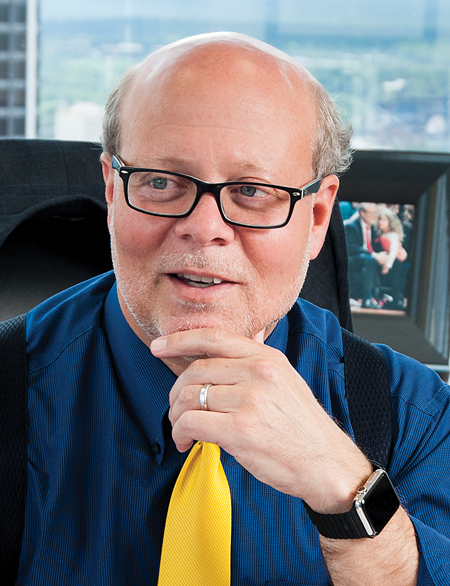
Randall Kessler
UNTETHERED TRAVEL
Doug Bend, founder of San Francisco-based Bend Law Group, a B certified corporation that focuses on helping entrepreneurs and startups, offers a flexible work policy with unlimited sick and vacation time for attorneys. Most of his attorneys are traveling at least six to eight weeks out of the year. Luthien Niland, a senior associate at Bend’s six-person firm, often works remotely three days a week from Lake Tahoe since her husband works on ski patrol there. When another attorney, Alex King, asked to move from the Bay Area to Sonoma, Bend says he saw it as an opportunity to pursue winery clients.
Having this policy works because the firm is largely transactional and doesn’t focus on litigation, Bend says, and he’s managed long-term employee retention by striking a happier, healthier balance with flex time.
“We get a monthly report from the bookkeeper of their expenses and net revenue,” says Bend, who uses Clio as his cloud-based management software. “To me it’s more important how many billable hours they have than where they are working.”
Randall Kessler’s video demonstrating how to get through a security check at the Hartsfield-Jackson Atlanta International Airport.
Randall Kessler’s video how to navigate easy parking at the Hartsfield-Jackson Atlanta International Airport.
To manage all the travel, Bend has all his attorneys sync up through a Google calendar to run a virtual law firm that meets in person once a week at various locations in San Francisco, ranging from the club lounge in his building to a Bank of America conference room. For teleconferencing, he uses UberConference because it sends an email update after each call about how long everyone spoke, so he can gauge productivity and to see whether someone dropped off a call early. Once a month he also schedules something fun on the calendar such as a barbecue or happy hour for everyone to mingle and stay connected.
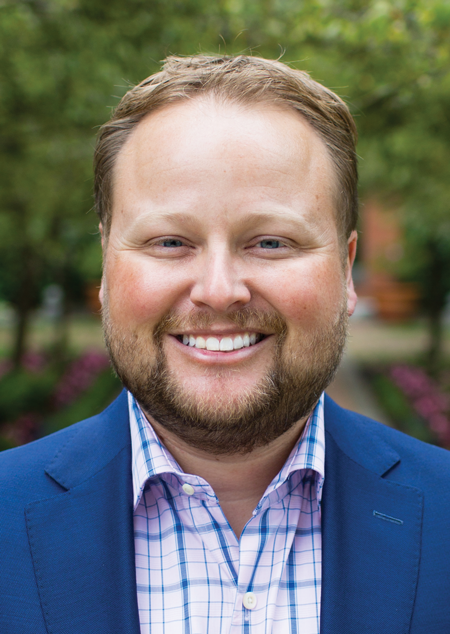
Doug Bend
While Bend is traveling on vacation, he prioritizes his work by focusing on billable client tasks instead of those that are administrative. That makes him more productive because of his laser focus on working only two hours a day to balance it with down time. “When I’m traveling I always have my out-of-office message on,” says Bend, who likes to travel with a Rimowa suitcase that weighs only 4.19 pounds. “It’s important to block out time to do the work and enjoy the travel. Then when I respond to clients they are more appreciative that I’m working while I’m traveling.”
But attorneys who frequently travel or work remotely need to take precautions to protect communications and client data. There are steps that can and should be taken when utilizing public internet access. Based on recommendations from her school’s IT staff, Lori Nelson, alumni relations director for the University of Utah’s S.J. Quinney College of Law, has instituted a number of cybersecurity measures while traveling. When using Wi-Fi, Nelson makes sure she’s connected to her school’s virtual private network to send and receive data.
“If you are going to send documents while traveling, you should make sure that rather than sending them as an attachment, you lodge them on an FTP site,” Nelson advises. “That way both you and the recipient have to sign in to get access to view the documents. Client portals, offered by some case management software as well as other providers, work great for this purpose.”
Nelson also points out platforms that can be used to encrypt text messages, such as ChatSecure and Wickr. If you’re texting from one Apple product to another (you can tell because messages appear with a blue background instead of green), those messages are already encrypted through Apple’s system.
“The best advice is just to be aware, know where your data is and how secure the network you are using is before you use it to have confidential communications,” Nelson says. (For more, see “21st-Century Standards,” page 24.)
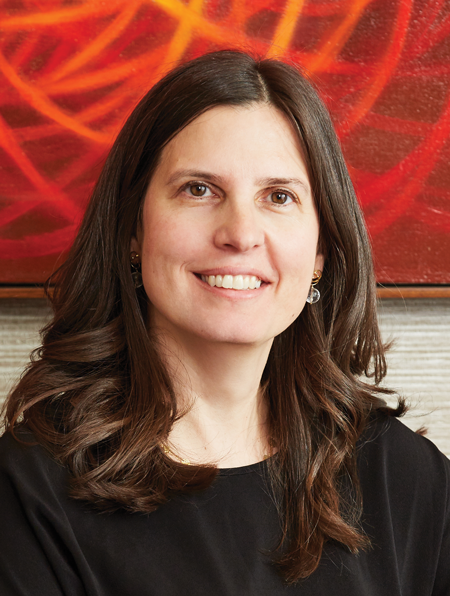
Laura Premi
Laura Premi, a partner at Cypress in Los Angeles, says she recently approached her firm about spending a year working abroad via Remote Year, a company that brings together 50 or more professionals who work in 12 different cities around the world. The application process includes a $5,000 down payment and $2,000 monthly installments, which includes private accommodations, travel between destinations, workspaces and Wi-Fi.
Premi says she approached the senior partners and other partners at the firm and explained that traveling abroad had been a lifetime passion of hers.
“I’m lucky to be at a firm that focuses on being innovative,” says Premi, who began traveling in April with a rotation among Vietnam, Thailand, Japan, Colombia, Peru, Portugal and Croatia, among other destinations. “Of course they had questions about the logistics, but they were really happy to facilitate my desire to see the world and thought it could be beneficial to my clients to learn firsthand how other companies are using technologies to work remotely.”
To manage the logistics, Premi has committed to being available at least four hours a day during the Pacific time zone, even if it’s sometimes 5-9 p.m. in LA because of the drastic time difference.
She dropped her U.S. carrier plan and transferred her cellphone number over to Google Voice so it can be forwarded to a Skype number since she will have Wi-Fi in all of her locations. Premi also plans to purchase local SIM cards in each country that will make her accessible to her colleagues via a VOIP app on her cellphone.
Before she left, Premi made sure her laptop was encrypted with LastPass as a password manager and will remote in using a VPN. She also purchased a second iPad to attach to her laptop so she can have an additional work screen through the app Duet Display.
“A lot of work can be done by computer and phone since technology allows you to work anywhere,” Premi says. “I can’t make court appearances or take depositions in person, but my team at Cypress is going to do it on my behalf and I’m going to use video technology to make it feel like I’m in the office when I’m not.”
Dawn Reiss is a Chicago-based freelance writer. For travel stories, she has gone dog sledding in Alaska, followed the Italian coffee trail in Turin and ate a cricket while on assignment in Cambodia.
This article appeared in the July 2017 issue of the ABA Journal with the headline "Traveling 2.0: Globe-trotting attorneys offer their new-era strategies for efficient business travel."




